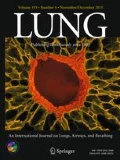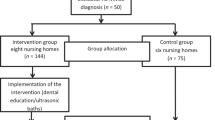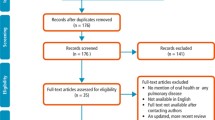Abstract
Pneumonia remains the leading cause of death in nursing home residents. The accumulation of dental plaque and colonization of oral surfaces and dentures with respiratory pathogens serves as a reservoir for recurrent lower respiratory tract infections. Control of gingivitis and dental plaques has been effective in reducing the rate of pneumonia but the provision of dental care for institutionalized elderly is inadequate, with treatment often sought only when patients experience pain or denture problems. Direct mechanical cleaning is thwarted by the lack of adequate training of nursing staff and residents’ uncooperativeness. Chlorhexidine-based interventions are advocated as alternative methods for managing the oral health of frail older people; however, efficacy is yet to be demonstrated in randomized controlled trials. Development and maintenance of an oral hygiene program is a critical step in the prevention of pneumonia. While resources may be limited in long-term-care facilities, incorporating oral care in daily routine practice helps to reduce systemic diseases and to promote overall quality of life in nursing home residents.
Similar content being viewed by others
References
US Department of Health and Human Services. HHS News, August 31, 1995, pp 1–3
Strahan GW (1997) An overview of nursing homes and their current residents: data from the 1995 National Nursing Home Survey. Adv Data 280:1–12
Strausbaugh L (1999) Epidemiology and prevention of infections in residents of long-term care facilities. In: Mayhall CG (ed) Hospital epidemiology and infection control. Lippincott, Williams & Wilkins, New York, pp 1461–1482
Norman DC (1991) Pneumonia in the elderly: empiric antimicrobial therapy. Geriatrics 46:26–32
Mehr DR, Zweig SC, Kruse RL, Popejoy L, Horman D et al (1998) Mortality from lower respiratory infection in nursing home residents. A pilot prospective community-based study. J Fam Pract 47:298–304
Muder RR (1998) Pneumonia in residents of long-term care facilities: epidemiology, etiology, management, and prevention. Am J Med 105:319–330
Jokinen C, Heiskanen L, Juvonen H, Kallinen S, Karkola K et al (1993) Incidence of community-acquired pneumonia in the population of four municipalities in eastern Finland. Am J Epidemiol 137:977–988
Jackson MM, Fierer J, Barrett-Connor E, Fraser D, Klauber MR et al (1992) Intensive surveillance for infections in a three-year study of nursing home patients. Am J Epidemiol 135:685–696
Loeb M, McGeer A, McArthur M, Walter S, Simor AE (1999) Risk factors for pneumonia and other lower respiratory tract infections in elderly residents of long-term care facilities. Arch Intern Med 159:2058–2064
Pick N, McDonald A, Bennett N, Litsche M, Dietsche L et al (1996) Pulmonary aspiration in a long-term care setting: clinical and laboratory observations and an analysis of risk factors. J Am Geriatr Soc 44:763–768
Heuser MD, Colvin PL Jr (1994) The “peripneumonia” period in the older adult. Compr Ther 20:300–305
Kaplan V, Angus DC, Griffin MF, Clermont G, Scott Watson R et al (2002) Hospitalized community-acquired pneumonia in the elderly: age- and sex-related patterns of care and outcome in the United States. Am J Respir Crit Care Med 165:766–772
Drinka PJ, Crnich CJ (2005) Pneumonia in the nursing home. J Am Med Dir Assoc 6:342–350
Mylotte JM, Goodnough S, Naughton BJ (2003) Pneumonia versus aspiration pneumonitis in nursing home residents: diagnosis and management. J Am Geriatr Soc 51:17–23
Scannapieco FA, Genco RJ (1999) Association of periodontal infections with atherosclerotic and pulmonary diseases. J Periodontal Res 34:340–345
Donowitz G, Mandell G (1990) Acute pneumonia. In: Mandell GDR, Bennett J (eds) Principles and practice of infectious diseases. Churchill Livingstone, New York, pp 540–555
Finegold SM (1991) Aspiration pneumonia. Rev Infect Dis 13(Suppl 9):S737–S742
Quagliarello V, Ginter S, Han L, Van Ness P, Allore H et al (2005) Modifiable risk factors for nursing home-acquired pneumonia. Clin Infect Dis 40:1–6
Langmore SE, Terpenning MS, Schork A, Chen Y, Murray JT et al (1998) Predictors of aspiration pneumonia: how important is dysphagia? Dysphagia 13:69–81
Slots J, Rams TE, Listgarten MA (1988) Yeasts, enteric rods and pseudomonads in the subgingival flora of severe adult periodontitis. Oral Microbiol Immunol 3:47–52
Slots J, Feik D, Rams TE (1990) Prevalence and antimicrobial susceptibility of Enterobacteriaceae, Pseudomonadaceae and Acinetobacter in human periodontitis. Oral Microbiol Immunol 5:149–154
Cantrell M (1999) Pneumonia. In: Hazzard W (ed) Principles of geriatric medicine and gerontology. McGraw-Hill, New York, pp 729–732
Sarin J, Balasubramaniam R, Corcoran AM, Laudenbach JM, Stoopler ET (2008) Reducing the risk of aspiration pneumonia among elderly patients in long-term care facilities through oral health interventions. J Am Med Dir Assoc 9:128–135
Russell SL, Boylan RJ, Kaslick RS, Scannapieco FA, Katz RV (1999) Respiratory pathogen colonization of the dental plaque of institutionalized elders. Spec Care Dentist 19:128–134
Sumi Y, Miura H, Michiwaki Y, Nagaosa S, Nagaya M (2007) Colonization of dental plaque by respiratory pathogens in dependent elderly. Arch Gerontol Geriatr 44:119–124
Leach SA (1967) Isolation in pure culture of human oral organisms capable of producing neuraminidase. Nature 216:599–600
Loesche WJ, Syed SA, Stoll J (1987) Trypsin-like activity in subgingival plaque. A diagnostic marker for spirochetes and periodontal disease? J Periodontol 58:266–273
Weyant RJ, Jones JA, Hobbins M, Niessen LC, Adelson R et al (1993) Oral health status of a long-term-care, veteran population. Community Dent Oral Epidemiol 21:227–233
Bassim CW, Gibson G, Ward T, Paphides BM, Denucci DJ (2008) Modification of the risk of mortality from pneumonia with oral hygiene care. J Am Geriatr Soc 56:1601–1607
Terpenning MS, Taylor GW, Lopatin DE, Kerr CK, Dominguez BL et al (2001) Aspiration pneumonia: dental and oral risk factors in an older veteran population. J Am Geriatr Soc 49:557–563
Mojon P, Budtz-Jorgensen E, Michel JP, Limeback H (1997) Oral health and history of respiratory tract infection in frail institutionalised elders. Gerodontology 14:9–16
Henry RG (1995) Functionally dependent veterans. Issues related to providing and improving their oral health care. Med Care 33:NS143–NS163
El-Solh AA, Pietrantoni C, Bhat A, Okada M, Zambon J et al (2004) Colonization of dental plaques: a reservoir of respiratory pathogens for hospital-acquired pneumonia in institutionalized elders. Chest 126:1575–1582
Scannapieco FA, Bush RB, Paju S (2003) Associations between periodontal disease and risk for nosocomial bacterial pneumonia and chronic obstructive pulmonary disease. A systematic review. Ann Periodontol 8:54–69
Awano S, Ansai T, Takata Y, Soh I, Akifusa S et al (2008) Oral health and mortality risk from pneumonia in the elderly. J Dent Res 87:334–339
Sjogren P, Nilsson E, Forsell M, Johansson O, Hoogstraate J (2008) A systematic review of the preventive effect of oral hygiene on pneumonia and respiratory tract infection in elderly people in hospitals and nursing homes: effect estimates and methodological quality of randomized controlled trials. J Am Geriatr Soc 56:2124–2130
Loesche WJ, Abrams J, Terpenning MS, Bretz WA, Dominguez BL et al (1995) Dental findings in geriatric populations with diverse medical backgrounds. Oral Surg Oral Med Oral Pathol Oral Radiol Endod 80:43–54
Kishi M, Ohara-Nemoto Y, Takahashi M, Kishi K, Kimura S et al (2010) Relationship between oral status and prevalence of periodontopathic bacteria on the tongues of elderly individuals. J Med Microbiol 59:1354–1359
Fernandes CB, Aquino DR, Franco GC, Cortelli SC, Costa FO et al (2010) Do elderly edentulous patients with a history of periodontitis harbor periodontal pathogens? Clin Oral Implants Res 21:618–623
Treloar DM, Stechmiller JK (1995) Use of a clinical assessment tool for orally intubated patients. Am J Crit Care 4:355–360
Terpenning M, Bretz W, Lopatin D, Langmore S, Dominguez B et al (1993) Bacterial colonization of saliva and plaque in the elderly. Clin Infect Dis 16(Suppl 4):S314–S316
Yoneyama T, Yoshida M, Ohrui T, Mukaiyama H, Okamoto H et al (2002) Oral care reduces pneumonia in older patients in nursing homes. J Am Geriatr Soc 50:430–433
Abe S, Ishihara K, Adachi M, Okuda K (2008) Tongue-coating as risk indicator for aspiration pneumonia in edentate elderly. Arch Gerontol Geriatr 47:267–275
Thean H, Wong ML, Koh H (2007) The dental awareness of nursing home staff in Singapore - a pilot study. Gerodontology 24:58–63
Coleman P (2005) Resistive behaviors of elderly nursing home residents during oral care. Geriatr Nurs 26:349–350
Hardy DL, Darby ML, Leinbach RM, Welliver MR (1995) Self-report of oral health services provided by nurses’ aides in nursing homes. J Dent Hyg 69:75–82
Peltola P, Vehkalahti MM, Wuolijoki-Saaristo K (2004) Oral health and treatment needs of the long-term hospitalised elderly. Gerodontology 21:93–99
Adachi M, Ishihara K, Abe S, Okuda K, Ishikawa T (2002) Effect of professional oral health care on the elderly living in nursing homes. Oral Surg Oral Med Oral Pathol Oral Radiol Endod 94:191–195
Ueda K, Toyosato A, Nomura S (2003) A study on the effects of short-, medium- and long-term professional oral care in elderly persons requiring long-term nursing care at a chronic or maintenance stage of illness. Gerodontology 20:50–56
Abe S, Ishihara K, Adachi M, Sasaki H, Tanaka K et al (2006) Professional oral care reduces influenza infection in elderly. Arch Gerontol Geriatr 43:157–164
Brecx M, Netuschil L, Reichert B, Schreil G (1990) Efficacy of Listerine, Meridol and chlorhexidine mouthrinses on plaque, gingivitis and plaque bacteria vitality. J Clin Periodontol 17:292–297
Hoffmann T, Bruhn G, Richter S, Netuschil L, Brecx M (2001) Clinical controlled study on plaque and gingivitis reduction under long-term use of low-dose chlorhexidine solutions in a population exhibiting good oral hygiene. Clin Oral Investig 5:89–95
Anderson RL, Carr JH, Bond WW, Favero MS (1997) Susceptibility of vancomycin-resistant enterococci to environmental disinfectants. Infect Control Hosp Epidemiol 18:195–199
Fourrier F, Duvivier B, Boutigny H, Roussel-Delvallez M, Chopin C (1998) Colonization of dental plaque: a source of nosocomial infections in intensive care unit patients. Crit Care Med 26:301–308
Koeman M, van der Ven AJ, Hak E, Joore HC, Kaasjager K et al (2006) Oral decontamination with chlorhexidine reduces the incidence of ventilator-associated pneumonia. Am J Respir Crit Care Med 173:1348–1355
Chlebicki MP, Safdar N (2007) Topical chlorhexidine for prevention of ventilator-associated pneumonia: a meta-analysis. Crit Care Med 35:595–602
Pineda LA, Saliba RG, El Solh AA (2006) Effect of oral decontamination with chlorhexidine on the incidence of nosocomial pneumonia: a meta-analysis. Crit Care 10:R35
Bellissimo-Rodrigues F, Bellissimo-Rodrigues WT, Viana JM, Teixeira GC, Nicolini E et al (2009) Effectiveness of oral rinse with chlorhexidine in preventing nosocomial respiratory tract infections among intensive care unit patients. Infect Control Hosp Epidemiol 30:952–958
Simons D, Brailsford SR, Kidd EA, Beighton D (2002) The effect of medicated chewing gums on oral health in frail older people: a 1-year clinical trial. J Am Geriatr Soc 50:1348–1353
Watando A, Ebihara S, Ebihara T, Okazaki T, Takahashi H et al (2004) Daily oral care and cough reflex sensitivity in elderly nursing home patients. Chest 126:1066–1070
Centers for Disease Control, Healthcare Infection Control Practices Advisory Committee (2004) Guidelines for preventing healthcare-associated pneumonia. MMWR Morbid Mortal Wkly Rep 53(3):1–36
Adachi M, Ishihara K, Abe S, Okuda K (2007) Professional oral health care by dental hygienists reduced respiratory infections in elderly persons requiring nursing care. Int J Dent Hyg 5:69–74
Ishikawa A, Yoneyama T, Hirota K, Miyake Y, Miyatake K (2008) Professional oral health care reduces the number of oropharyngeal bacteria. J Dent Res 87:594–598
Author information
Authors and Affiliations
Corresponding author
Rights and permissions
About this article
Cite this article
El-Solh, A.A. Association Between Pneumonia and Oral Care in Nursing Home Residents. Lung 189, 173–180 (2011). https://doi.org/10.1007/s00408-011-9297-0
Received:
Accepted:
Published:
Issue Date:
DOI: https://doi.org/10.1007/s00408-011-9297-0




